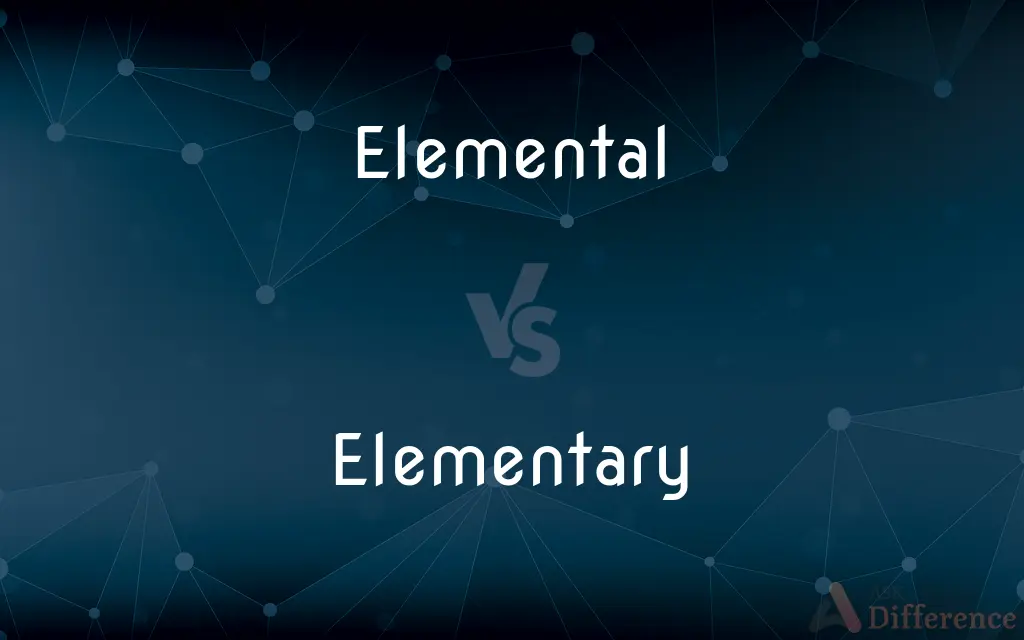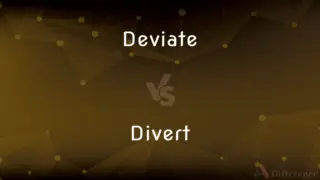Elemental vs. Elementary — What's the Difference?
By Tayyaba Rehman & Maham Liaqat — Updated on April 9, 2024
Elemental refers to fundamental forces or principles, often of nature, while elementary denotes the introductory or basic aspects of a subject.

Difference Between Elemental and Elementary
Table of Contents
ADVERTISEMENT
Key Differences
Elemental is a term deeply rooted in the concept of primary forces or essential qualities, often related to nature or the universe. It carries a sense of the foundational building blocks, whether in terms of chemistry, philosophy, or spirituality. Whereas, elementary is commonly associated with the foundational or introductory levels of education or understanding. It implies something is at the basic, initial stage, suitable for beginners.
While elemental qualities are often seen as powerful and sometimes untamable, reflecting the raw aspects of nature like fire, water, earth, and air, elementary principles are seen as approachable and structured, forming the stepping stones for further learning or development.
Elemental can also suggest a purity or simplicity at a profound level, hinting at something's intrinsic nature that cannot be reduced further. On the other hand, elementary often conveys simplicity in terms of ease and accessibility, making it an essential starting point for learning.
In the context of complexity, elemental suggests a complexity that is innate and fundamental, where the basic elements combine to form more complex systems. Conversely, elementary refers to simplicity and the foundation from which complexity can be built and understood.
The use of "elemental" in literature or conversation evokes a sense of awe or respect for the primal forces it describes, while "elementary" typically does not carry such connotations, instead focusing on the basic, initial understanding of concepts.
ADVERTISEMENT
Comparison Chart
Definition
Relating to fundamental forces or principles of nature
Relating to the introductory or basic aspects
Context
Often used in science, philosophy, and spirituality
Primarily used in education and learning
Connotation
Implies power, depth, and innate complexity
Implies simplicity, accessibility, and a starting point
Complexity
Innate and profound, suggesting a base level of nature
Simple and foundational, leading to more complex understanding
Usage in Literature
Evokes awe and respect for primal forces
Focuses on basic understanding without awe
Compare with Definitions
Elemental
Simple and powerful.
The elemental design of the building made a striking impression.
Elementary
Basic principles or rudiments.
He has an elementary understanding of cooking.
Elemental
Fundamental or essential.
Respect is elemental to any successful relationship.
Elementary
Simple and straightforward.
The instructions were elementary and easy to follow.
Elemental
Pertaining to elements.
Water is an elemental resource for all living beings.
Elementary
Primary or initial stage.
The elementary school curriculum focuses on reading, writing, and arithmetic.
Elemental
Relating to the basic forces of nature.
The study focused on elemental forces like wind and fire.
Elementary
Basic or introductory level.
She is taking elementary courses in biology.
Elemental
Innate or inherent.
There's an elemental beauty in the simplicity of the landscape.
Elementary
Concerning the fundamental aspects.
Understanding gravity is elementary to physics.
Elemental
An elemental is a mythic being that is described in occult and alchemical works from around the time of the European Renaissance, and particularly elaborated in the 16th century works of Paracelsus. According to Paracelsus and his subsequent followers, there are four categories of elementals, which are gnomes, undines, sylphs, and salamanders.
Elementary
Of, relating to, or constituting the basic, essential, or fundamental part
An elementary need for love and nurturing.
Elemental
Of, relating to, or being an element.
Elementary
Of, relating to, or involving the fundamental or simplest aspects of a subject
An elementary problem in statistics.
Elemental
Fundamental or essential; basic.
Elementary
Of or relating to an elementary school or elementary education
The elementary grades.
Elementary teachers.
Elemental
Of or relating to fundamentals; elementary.
Elementary
Relating to the basic, essential or fundamental part of something.
Elemental
Constituting an integral part; inborn.
Elementary
Relating to an elementary school.
Elemental
Of such character as to resemble a force of nature in power or effect
Elemental violence.
Elementary
(physics) Relating to a subatomic particle.
Elemental
In certain occult systems, an inhabitant of one of the four elements, especially any of the beings described by Paracelsus as intermediate in corporeality between humans and spirits.
Elementary
(archaic) Sublunary; not celestial; belonging to the sublunary sphere, to which the four classical elements (earth, air, fire and water) were confined; composed of or pertaining to these four elements.
Elemental
(chemistry) Of, relating to, or being an element (as opposed to a compound).
Elementary
An elementary school
Elemental
Basic, fundamental or elementary.
Elementary
A supernatural being which is associated with the elements.
Elemental
Of the ancient supposed elements of earth, air, fire and water.
Elementary
Having only one principle or constituent part; consisting of a single element; simple; uncompounded; as, an elementary substance.
Elemental
(by extension) Of, or relating to a force of nature, especially to severe atmospheric conditions.
Elementary
Pertaining to, or treating of, the elements, rudiments, or first principles of anything; initial; rudimental; introductory; as, an elementary treatise.
Elemental
A creature (usually a spirit) that is attuned with, or composed of, one of the classical elements: air, earth, fire and water or variations of them like ice, lightning, etc. They sometimes have unique proper names and sometimes are referred to as Air, Earth, Fire, or Water.
Elementary
Pertaining to one of the four elements, air, water, earth, fire.
Elemental
Pertaining to the elements, first principles, and primary ingredients, or to the four supposed elements of the material world; as, elemental air.
Elementary
Easy and not involved or complicated;
An elementary problem in statistics
Elementary, my dear Watson
A simple game
Found an uncomplicated solution to the problem
Elemental
Pertaining to rudiments or first principles; rudimentary; elementary.
Elementary
Of or being the essential or basic part;
An elementary need for love and nurturing
Elemental
Being or resembling a force of nature;
Elemental violence
Elemental
Being the ultimate or elemental constituents of anything;
The elemental stuff of...out of which the many forms of life have been molded
The ultimate ingredients of matter
His proposal is elegantly simple
Elemental
Relating to or being an element;
Elemental sulphur
Elemental
Relating to severe atmospheric conditions;
A race against hail or cold rains or some other elemental catastrophe
Common Curiosities
What does elementary mean?
Elementary denotes something introductory or at a basic level, particularly in learning or understanding a subject.
What is elemental?
Elemental refers to the basic, powerful forces or principles, often related to nature or the essence of something.
How are elemental and elementary different in usage?
Elemental is used to describe fundamental forces or principles, often with a sense of power or depth, whereas elementary refers to basic, introductory aspects of a subject.
Is elemental related to the elements?
Yes, elemental often pertains to the basic forces of nature, such as earth, air, fire, and water.
Can something be both elemental and elementary?
While they focus on foundational aspects, elemental implies a deeper, more innate complexity, and elementary suggests simplicity and accessibility.
Do both terms have a place in education?
Yes, elemental concepts might be explored in advanced studies, while elementary principles form the basis of early learning.
Are elemental aspects teachable in an elementary manner?
Yes, the fundamental concepts of elemental aspects can be taught in an elementary, or basic, manner for understanding.
Does elementary refer only to education?
Primarily, but it can also refer to the basic level of any subject or activity.
How do elemental and elementary approaches differ in problem-solving?
An elemental approach might look at the fundamental nature of the problem, whereas an elementary approach would tackle it from a basic, introductory level.
Can an understanding of elementary principles lead to a deeper exploration of elemental concepts?
Yes, mastering elementary principles can provide a foundation for delving into more complex, elemental concepts.
Is elemental more related to philosophy or science?
Elemental has significant relevance in both, depending on context, relating to both the physical and the metaphysical.
Which term implies a greater complexity?
Elemental implies a greater complexity in its simplicity, suggesting fundamental forces or principles.
Can elementary principles evolve into something more complex?
Yes, elementary principles are the building blocks for more complex understanding or systems.
How do perceptions of elemental and elementary differ in society?
Elemental is often seen with a sense of respect or awe for natural forces, while elementary is viewed as accessible, basic education or understanding.
Which term would be used to describe the basic components of a chemical compound?
Elemental, as it pertains to the essential, basic forces or parts of nature.
Share Your Discovery

Previous Comparison
Deviate vs. Divert
Next Comparison
Assignation vs. AssignmentAuthor Spotlight
Written by
Tayyaba RehmanTayyaba Rehman is a distinguished writer, currently serving as a primary contributor to askdifference.com. As a researcher in semantics and etymology, Tayyaba's passion for the complexity of languages and their distinctions has found a perfect home on the platform. Tayyaba delves into the intricacies of language, distinguishing between commonly confused words and phrases, thereby providing clarity for readers worldwide.
Co-written by
Maham Liaqat













































